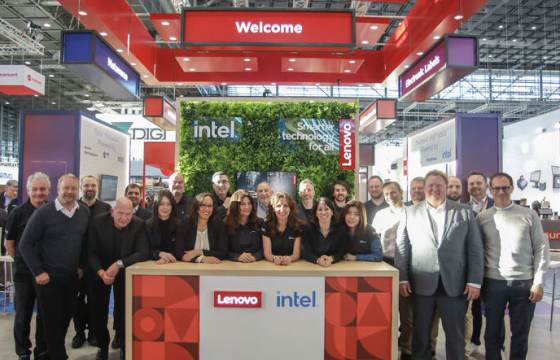
The IMS Evolve Team has just about recovered after a bumper week out at Euroshop. Check out our three key takeaways from this year's event!
The IMS team has just about recovered from a bumper week in Dusseldorf for the world’s largest retail fair, Euroshop. In the three years since the last Euroshop, we have seen significant global turbulence across all aspects of life, and it’s fair to say that the retail landscape has evolved because of it. Despite this, 2023’s Euroshop held the same magnitude it always has and will without doubt keep the crown of the world’s leading trade fair with 17 immense halls seeing over 81,000 visitors come through its doors. Alongside our partners, Lenovo, the event provided a platform to connect with existing and potential customers and partners, showcase our innovative technology, and discuss how digitalisation is transforming the sector as well as what the future of retail might look like. From the energy transition to AI, here are some of our key Euroshop takeaways:
1 ) An energy focus
The overarching theme at Euroshop this year was, unsurprisingly, energy. Against the backdrop of the energy crisis, escalating costs, and the push for a transition to renewable sources of power, energy in and of itself is a critical topic of discussion in the retail space. When retailers are able to enact percentage point changes in their consumption, it can create a very real and very immediate impact on expenditure: the importance and impact of technologies, such as IMS Evolve’s, which reduces and optimises energy consumption as well as enabling dynamic energy management capabilities, certainly didn’t go unnoticed during the conference.
Green innovation was also a key part of the conversation, as our Chief Operating Officer, Jason Kay, discussed in his keynote speech at the conference. ‘Cold’ is an energy asset in its own right, and being able to achieve optimal temperatures with minimal carbon footprint and change the capacity of energy consumption profiles by leveraging control to shift and reduce usage will prove critical for green transformation, and is a great example of the forward-thinking innovations coming to market for retailers to tackle the very real and immediate energy challenges.
2 ) Accelerated time to value
With challenges such as the soaring energy costs mentioned above, in an already tight-margined industry such as retail, investments of any kind must release significant value – and fast.
This year, Euroshop visitors were not only keen to see the newest inventions and latest technologies, but also to understand how they would deliver tangible results and time to release. It is perhaps more important than ever that vendors and suppliers bring turn-key, fast-to-unlock value release programmes to market in order to maintain competitive advantage and create immediate return on investment for customers.
For IMS, return on investment for our customers has always been a laser focus. However, on top of this, we understand the importance of investing not just for the now, but for the future. Building a partnership with our customers to understand their ongoing needs and purpose allows us to continue stacking the business cases for not just months, but years, allowing us to continue releasing value as our customers evolve.
3 ) AI is the future
By now we’ve all at least had a play around with ChatGPT or other AI platforms, so it will come as no surprise that the phrase on everyone’s lips during Euroshop was ‘artificial intelligence’. One of the big challenges that was clear for everyone to see, though, was that the definition of what AI is and what it can do for retailers is still uncertain.
If we look at the digital envelope, what would traditionally be confined to electronic controls or big data centres is now modular and flexible across entire system architectures. Can the same be said of AI? The answer is ‘not really… not yet’.
As our partners, Lenovo, said during the show, AI is for the most part only really seen in the retail space at the edge – it uses the data collected in order to make instant, real-time decisions. This is especially helpful for critical assets, like refrigeration in retail environments, where the ability to monitor and manage health and performance and make immediate change is crucial to protecting food stock and maintaining availability but, could AI be used elsewhere in within the retail tech architecture? Only time will tell…